牛津译林版七年级英语上册Unit1知识点复习归纳
牛津译林版七年级英语上册Unit1归纳知识点汇总

牛津译林版七年级英语上册Unit1归纳知识点汇总一、单词短语1.love比like程度更深love doing/to do sth. loving doing多表示一贯的爱好,而love to do则多表示具体喜欢做的一件事。
enjoy doing sth (enjoy 译为喜欢,只能加doing)2.What's your name ? 回答:My name is .../ I’m....询问名字的方法还有:May I have your name ?/ Can you tell me your name ?3.master主人one’s master = the master of sb 某物或某人的主人Master(硕士)4.5.How to look after your e-dog.如何照顾你的电子狗。
疑问词+ 不定式(to do)如:I don’t know what to eat.look after=take care of照顾;照料I can look after myself.我能照顾我自己。
look after sb well = take good care of sb 照顾好某人look for 寻找look at 看。
look like 看起来像look out 小心(=Be careful! / Take care)look out of 朝...往外看look the same 看起来一样6.The new students in Class 1, Grade 7 at Sunshine Middle School are greeting each other.Class One Grade Seven 由小到大,都要大写用法相同的还有number ,lesson,unit,group,roomI’m in Grade 7.(对划线部分提问)What/ Which grade are you in?Our school has six grades.我们学校有6个年级。
初中英语牛津译林版七年级英语上册知识点第一单元
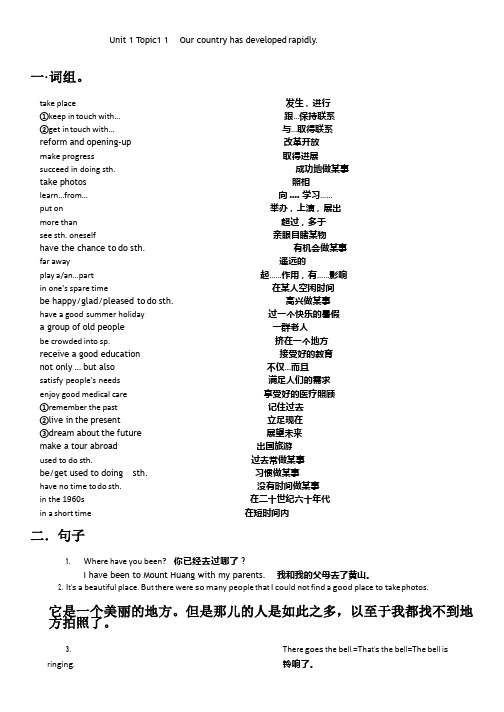
Unit 1 T opic1 1 Our country has developed rapidly.一·词组。
take place 发生,进行①keep in touch with…跟…保持联系②get in touch with…与…取得联系reform and opening-up 改革开放make progress 取得进展succeed in doing sth. 成功地做某事take photos 照相learn…from…向 .... 学习……put on 举办,上演,展出more than 超过,多于see sth. oneself 亲眼目睹某物have the chance to do sth. 有机会做某事far away 遥远的play a/an…part起……作用,有……影响in one's spare time 在某人空闲时间be happy/glad/pleased to do sth. 高兴做某事have a good summer holiday 过一个快乐的暑假a group of old people 一群老人be crowded into sp. 挤在一个地方receive a good education 接受好的教育not only … but also 不仅…而且satisfy people's needs 满足人们的需求enjoy good medical care 享受好的医疗照顾①remember the past 记住过去②live in the present 立足现在③dream about the future 展望未来make a tour abroad 出国旅游used to do sth. 过去常做某事be/get used to doing sth. 习惯做某事have no time to d o sth. 没有时间做某事in the 1960s 在二十世纪六十年代in a short time 在短时间内二.句子1.Where have you been? 你已经去过哪了?I have been to Mount Huang with my parents. 我和我的父母去了黄山。
Unit1重要知识点牛津译林版英语七年级上册
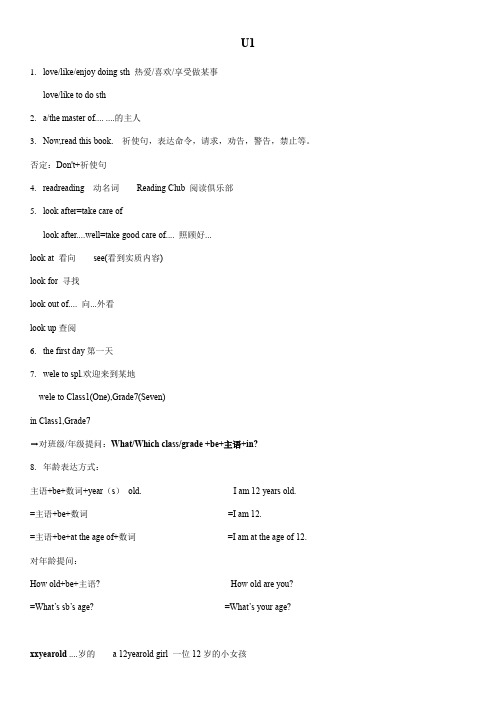
U11.love/like/enjoy doing sth 热爱/喜欢/享受做某事love/like to do sth2.a/the master of.... ....的主人3.Now,read this book. 祈使句,表达命令,请求,劝告,警告,禁止等。
否定:Don't+祈使句4.readreading 动名词Reading Club 阅读俱乐部5.look after=take care oflook after....well=take good care of.... 照顾好...look at 看向see(看到实质内容)look for 寻找look out of.... 向...外看look up查阅6.the first day第一天7.wele to spl.欢迎来到某地wele to Class1(One),Grade7(Seven)in Class1,Grade7➡对班级/年级提问:What/Which class/grade +be+主语+in?8.年龄表达方式:主语+be+数词+year(s)old. I am 12 years old.=主语+be+数词=I am 12.=主语+be+at the age of+数词=I am at the age of 12.对年龄提问:How old+be+主语? How old are you?=What’s sb’s age? =What’s your age? xxyearold ....岁的 a 12yearold girl 一位12岁的小女孩9.play+球类运动play footballplay the+乐器名词play the piano10.after class/school/lunch....11.be from=e from 来自Where +be+主语+from?=Where+助动词+主语+e from?12.be good at (doing ) sth=do well in (doing) sth 擅长做某事(=do sth well)13.★Be动词的一般现在时14.at the age of... 在...岁时15.go walking➡go+ving=go for a walkgo swimming=go for a swim16.glad/nice to meet you. ➡It's glad/nice to meet you.It’s+adj.+to do sth做某事....17.I see.我明白了。
牛津译林版七年级上册英语Unit1知识点总结

牛津译林版七年级上册英语Unit1知识点总结Unit 1 This is me!1.How to look after your e-dogIf you want to take care of your electronic dog。
you need to know how to do it。
"How to" is a n word followed by an infinitive verb。
"Look after" means to take care of something or XXX.2.Good evening.Good evening" XXX。
It is different from "good night," which is used when XXX.3.XXXIf you enjoy playing football after school。
you can say that you love it。
"Love/like doing something" XXX。
while "love/like to do something" emphasizes a one-time n.For example。
"She loves watching TV。
but today she loves to listen to music." "Love" can be used as a verb to mean "like" or "enjoy," as in "He loves his parents" or "She loves music." It can also be used as a noun to mean "n" or "beloved," as in "a mother's love for her children" or "fall in love with XXX."nally。
牛津译林版七年级上册英语Unit1知识点汇总

牛津译林版七年级上册英语Unit1知识点汇总7A Unit 1 This is me!一.【精选短语】1. how to look after your e-dog如何照顾你的电子狗(1)疑问词+动词不定式(2)look after=take care of 照顾,照料2. Good evening.晚上好。
(晚上见面问候语)→比较:Good night.晚安。
(晚上分别时用语)3. love playing football after school喜爱放学后踢足球【知识链接】Love/like doing sth.喜欢做某事,强调习惯上的喜欢;Love/like to do sth.强调的是某一次的行为。
e.g. She loves watching TV, but today she loves to listen to music. Love的用法⑴vt.喜爱e.g. ①He loves his parents. (不能用like代替love)②She loves music.她爱好音乐。
⑵vt.热爱e.g. We love our motherland.我们热爱祖国。
⑶n.爱;挚爱a mother’s love for her children母亲对孩子的爱②fall in love with sb爱上…,e.g. He fell in love with her.③我们可在书信的结尾处看到例如Love Mary这样的署名,意思是With my love, Mary,一方面表示情感,一方面表示道别。
【用法拓展】lovely美丽的;可爱的e.g. lovely hair秀发,a lovely girl美丽的少女4. be good at sth/doing sth=do well in sth/doing sth擅长;在某方面表现好【知识链接】⑴He is good at telling funny jokes.⑵She always does well in English.5. wear glasses戴眼镜→ wear后接服装、装饰品等,表示“穿、戴”。
初中英语 牛津译林版七年级上册 Unit 1知识点详解

牛津译林版七年级英语上册Unit1知识点归纳词汇:1. glad adj. 高兴的,近义词:happy ,pleased 等Eg :Glad to see you . = Nice to see you. = Pleased to see you. 见到你很高兴。
(回答)Glad/Nice/ Pleased to see you, too.2. cute adj. 可爱的,讨人喜欢的。
近义词:lovely,clever,pretty等。
3. glasses n.(复数)眼镜。
A pair of glasses 一副眼镜【知识拓展】:glass : “玻璃”不可数名词。
“玻璃杯”可数名词。
短语归纳1、look after / take care of 照顾2、on the first day 在第一天3、Class 1,Grade 7 7年级1班4、play football 踢足球5、after school 放学后6、be /come from 来自7、be good at / do well in 擅长8、fly kites 放风筝9、tell sb. about sth. 告诉某人关于某事10、listen to music 听音乐11、play a game 玩游戏12、wear glasses 戴眼镜13、at school 在学校14、all the lessons 所有的课程15、talk about 谈论16、need to sth. 需要做...... 17、a lot of hobbies 许多爱好18、get to know 认识19. the same as 和......一样20. use...to do sth. 用......做某事21. live with ... 和......住一起词汇用法区别:1.love, like & enjoy2. read, look, see , watch, look at, have a look at本单元应该掌握的句子:1.What’s your name?你叫什么名字?2.Nice to meet you! 很高兴见到你。
牛津译林版七年级英语上册unit1重点语法归纳.doc
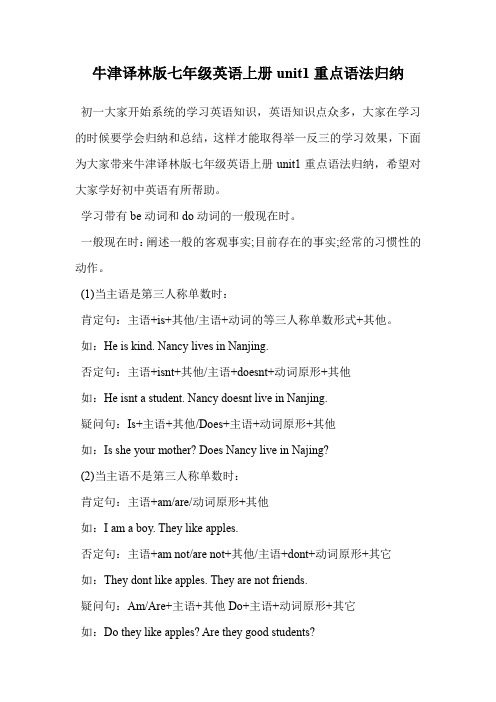
牛津译林版七年级英语上册unit1重点语法归纳初一大家开始系统的学习英语知识,英语知识点众多,大家在学习的时候要学会归纳和总结,这样才能取得举一反三的学习效果,下面为大家带来牛津译林版七年级英语上册unit1重点语法归纳,希望对大家学好初中英语有所帮助。
学习带有be动词和do动词的一般现在时。
一般现在时:阐述一般的客观事实;目前存在的事实;经常的习惯性的动作。
(1)当主语是第三人称单数时:肯定句:主语+is+其他/主语+动词的等三人称单数形式+其他。
如:He is kind. Nancy lives in Nanjing.否定句:主语+isnt+其他/主语+doesnt+动词原形+其他如:He isnt a student. Nancy doesnt live in Nanjing.疑问句:Is+主语+其他/Does+主语+动词原形+其他如:Is she your mother? Does Nancy live in Najing?(2)当主语不是第三人称单数时:肯定句:主语+am/are/动词原形+其他如:I am a boy. They like apples.否定句:主语+am not/are not+其他/主语+dont+动词原形+其它如:They dont like apples. They are not friends.疑问句:Am/Are+主语+其他Do+主语+动词原形+其它如:Do they like apples? Are they good students?牛津译林版七年级英语上册unit1重点语法归纳为大家带来过了,英语的学习重在掌握知识点,希望大家能够熟练掌握上面的内容,这样大家的英语成绩就能迅速提升。
牛津译林版七年级英语上册Unit-1单元知识点归纳
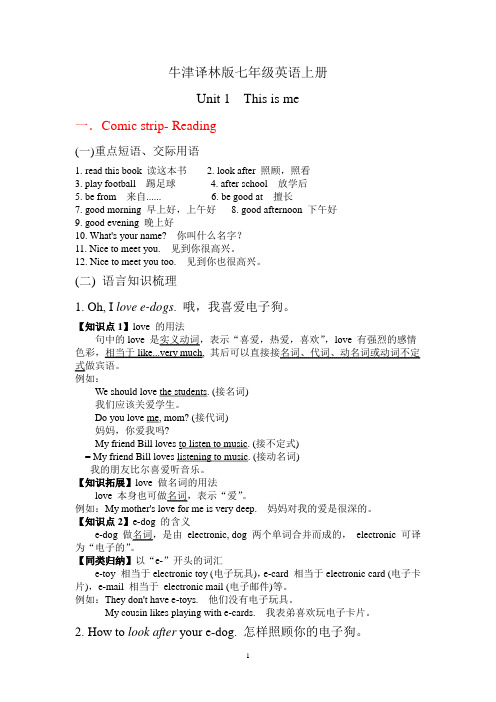
牛津译林版七年级英语上册Unit 1 This is me一.Comic strip- Reading(一)重点短语、交际用语1.read this book 读这本书2. look after 照顾,照看3. play football 踢足球4. after school 放学后5. be from 来自......6. be good at 擅长7. good morning 早上好,上午好8. good afternoon 下午好9. good evening 晚上好10. What's your name? 你叫什么名字?11. Nice to meet you. 见到你很高兴。
12. Nice to meet you too. 见到你也很高兴。
(二) 语言知识梳理1. Oh, I love e-dogs. 哦,我喜爱电子狗。
【知识点1】love 的用法句中的love 是实义动词,表示“喜爱,热爱,喜欢”,love 有强烈的感情色彩,相当于like...very much, 其后可以直接接名词、代词、动名词或动词不定式做宾语。
例如:We should love the students. (接名词)我们应该关爱学生。
Do you love me, mom? (接代词)妈妈,你爱我吗?My friend Bill loves to listen to music. (接不定式)= My friend Bill loves listening to music. (接动名词)我的朋友比尔喜爱听音乐。
【知识拓展】love 做名词的用法love 本身也可做名词,表示“爱”。
例如:My mother's love for me is very deep. 妈妈对我的爱是很深的。
【知识点2】e-dog 的含义e-dog 做名词,是由electronic, dog 两个单词合并而成的,electronic 可译为“电子的”。
牛津译林版七年级英语上册Unit1单元知识点复习
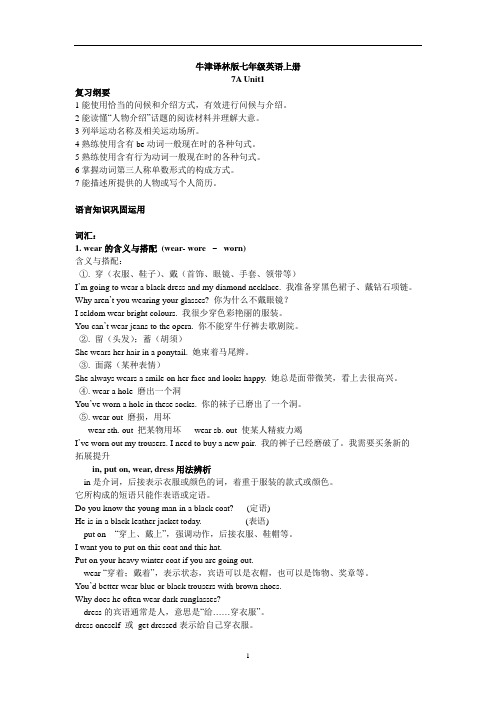
牛津译林版七年级英语上册7A Unit1复习纲要1能使用恰当的问候和介绍方式,有效进行问候与介绍。
2能读懂“人物介绍”话题的阅读材料并理解大意。
3列举运动名称及相关运动场所。
4熟练使用含有be动词一般现在时的各种句式。
5熟练使用含有行为动词一般现在时的各种句式。
6掌握动词第三人称单数形式的构成方式。
7能描述所提供的人物或写个人简历。
语言知识巩固运用词汇:1. wear的含义与搭配(wear- wore –worn)含义与搭配:①. 穿(衣服、鞋子)、戴(首饰、眼镜、手套、领带等)I’m going to wear a black dress and my diamond necklace. 我准备穿黑色裙子、戴钻石项链。
Why aren’t you wearing your glasses? 你为什么不戴眼镜?I seldom wear bright colours. 我很少穿色彩艳丽的服装。
You can’t wear jeans to the opera. 你不能穿牛仔裤去歌剧院。
②. 留(头发);蓄(胡须)She wears her hair in a ponytail. 她束着马尾辫。
③. 面露(某种表情)She always wears a smile on her face and looks happy. 她总是面带微笑,看上去很高兴。
④. wear a hole 磨出一个洞You’ve worn a hole in these socks. 你的袜子已磨出了一个洞。
⑤. wear out 磨损,用坏wear sth. out 把某物用坏wear sb. out 使某人精疲力竭I’ve worn out my trousers. I need to buy a new pair. 我的裤子已经磨破了。
我需要买条新的拓展提升in, put on, wear, dress用法辨析in是介词,后接表示衣服或颜色的词,着重于服装的款式或颜色。
牛津译林版七年级上册英语Unit1语法总结

牛津译林版七年级上册英语Unit1语法总结1. 一般现在时一般现在时表示经常性、惯性或普遍性的动作或状态。
其构成为:主语 + 动词原形 (+ 其他补充成分)。
例句:- I play basketball every day.(我每天打篮球。
)- She likes reading books.(她喜欢读书。
)2. 句型:主语 + be + 形容词这种句型用来表达主语的状态或特征。
例句:- The weather is sunny today.(今天天气阳光明媚。
)- He is tall and handsome.(他又高又帅。
)3. 一般过去时一般过去时用来表示过去某个时间发生的动作或存在的状态。
其构成为:主语 + 动词过去式 (+ 其他补充成分)。
例句:- They went to the park yesterday.(他们昨天去了公园。
)- We lived in Shanghai five years ago.(我们五年前住在上海。
)4. 句型:主语 + be + 动词-ing这种句型用来表示主语正在进行的动作。
例句:- I am studying English now.(我现在正在研究英语。
)- They were playing soccer in the park yesterday.(他们昨天在公园踢足球。
)5. 一般将来时一般将来时用来表示将来某个时间将要发生的动作或存在的状态。
其构成为:主语 + will + 动词原形 (+ 其他补充成分)。
例句:- We will have a party next week.(下周我们将举行一个派对。
)- She will visit her grandparents tomorrow.(她明天将去看望她的祖父母。
)6. 句型:主语 + be + going to + 动词原形这种句型用来表示主语打算或计划将要发生的动作。
例句:- I am going to meet my friends this afternoon.(今天下午我将去见我的朋友。
牛津译林版七年级英语上册Unit1知识点
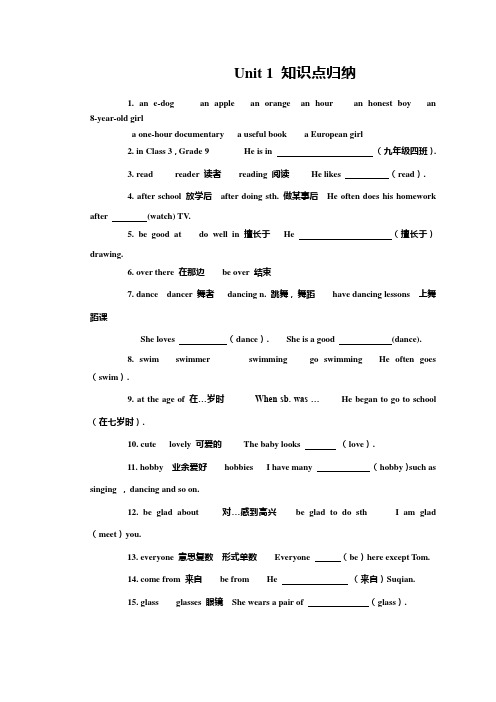
Unit 1 知识点归纳1. an e-dog an apple an orange an hour an honest boy an 8-year-old girla one-hour documentary a useful book a European girl2. in Class 3,Grade 9 He is in (九年级四班).3. read reader 读者reading 阅读He likes (read).4. after school 放学后after doing sth. 做某事后He often does his homework after (watch) TV.5. be good at do well in 擅长于He (擅长于)drawing.6. over there 在那边be over 结束7. dance dancer 舞者dancing n. 跳舞,舞蹈have dancing lessons 上舞蹈课She loves (dance). She is a good (dance).8. swim swimmer swimming go swimming He often goes (swim).9. at the age of 在…岁时When sb. was …He began to go to school (在七岁时).10. cute lovely 可爱的The baby looks (love).11. hobby 业余爱好hobbies I have many (hobby)such as singing ,dancing and so on.12. be glad about 对…感到高兴be glad to do sth I am glad (meet)you.13. everyone 意思复数形式单数Everyone (be)here except Tom.14. come from 来自be from He (来自)Suqian.15. glass glasses 眼镜She wears a pair of (glass).7上Unit1知识点1. read (book、map、newspaper)看look at 看… (看的过程)see (film、a doctor)(看的结果)watch (TV、match)(动态的)I looked at the tree,but I couldn’t see anything.2. how to look after your e-dog I don’t know what (do)next.3. 12 years old 12-year-old 十二岁的He is 12 years old. He is a12-year-old boy.4. love reading 喜爱阅读love / like doing sth. / to do sth. He loves( dance).5. have long hair 留着长发have short hair 留着短发6. let’s do sth. let us do sth. Let’s (play)football afterschool.7. come from = be from He (来自)Shanghai.8. be good at sth / doing sth. do well in sth / doing sth. He(擅长) swimming.9. be 动词用法I 用am ,you 用are ;is 用于he、she、it;单数is,复数are。
牛津译林版七年级英语上册Unit 1 重点知识点归纳
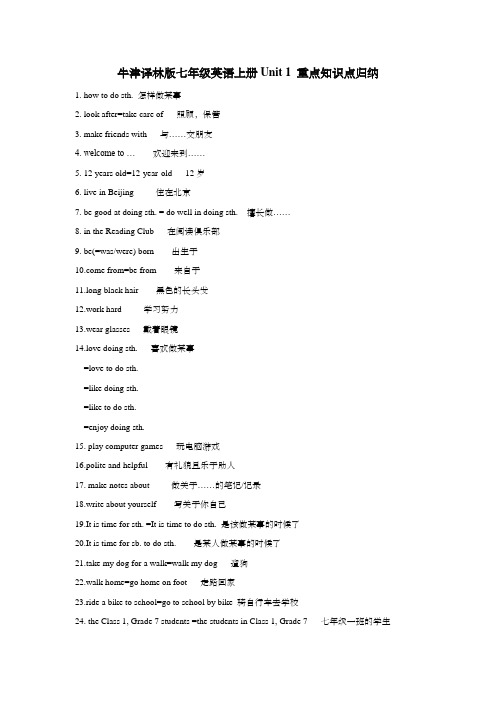
牛津译林版七年级英语上册Unit 1 重点知识点归纳1. how to do sth. 怎样做某事2. look after=take care of 照顾,保管3. make friends with 与……交朋友4. welcome to … 欢迎来到……5. 12 years old=12-year-old 12岁6. live in Beijing 住在北京7. be good at doing sth. = do well in doing sth. 擅长做……8. in the Reading Club 在阅读俱乐部9. be(=was/were) born 出生于e from=be from 来自于11.long black hair 黑色的长头发12.work hard 学习努力13.wear glasses 戴着眼镜14.love doing sth. 喜欢做某事=love to do sth.=like doing sth.=like to do sth.=enjoy doing sth.15. play computer games 玩电脑游戏16.polite and helpful 有礼貌且乐于助人17. make notes about 做关于……的笔记/记录18.write about yourself 写关于你自己19.It is time for sth. =It is time to do sth. 是该做某事的时候了20.It is time for sb. to do sth. 是某人做某事的时候了21.take my dog for a walk=walk my dog 遛狗22.walk home=go home on foot 走路回家23.ride a bike to school=go to school by bike 骑自行车去学校24. the Class 1, Grade 7 students =the students in Class 1, Grade 7 七年级一班的学生25. help sb. do sth.=help sb. with sth. 帮助某人做某事26. badminton court 羽毛球场27. football field 足球场28.swimming pool 游泳池29. write to sb. 写信给某人30.go running 去跑步31.watch football match 观看足球比赛32.at my grandparents’ home 在我祖父母家33.at the weekend=at weekends 在周末34.fly a kite with sb. 和某人一起放风筝35.a piece of Sports News 一则体育新闻36.play for… 为……效力37.the newest member 最新的成员38.score goals 进球得分39.the next World Cup 下一届世界杯40. one’s favourite football player 某人最喜欢的足球运动员41. look strong (nice, happy...)看起来很强壮(漂亮,高兴……)42.play very well in the match 在比赛中表现得很好43.in the school football team 在学校足球队44.win the match 赢了比赛45. borrow sth. from sb. 向某人借某物46.lend sth. to sb. 把某物借给某人47.say sth. in English 用英语说某物48.the answer to sth. 某物的答案49.begin/start to do sth. 开始做某事50.dark brown eyes 深褐色的眼睛51.live with sb. in spl. 和某人一起住在某地52.lots of = a lot of 许多53.It sounds great! 听起来真棒!7A Unit 1 语法——一般现在时一、定义与讲解一般现在时:表示经常性的事情,经常性的动作或一般性事实。
Unit1知识点整理牛津译林版七年级英语上册

7A Unit 1 知识点整理1.love/like sb./sth. 喜欢某人/某物love/like to do sth. 喜欢做某事(一时喜欢,常指一个具体的动作) love/like doing sth. 喜欢做某事(一直喜欢,可以指兴趣爱好)●I like watching films. I like Liu Dehua and his films. But don’t like to watch a film with my friend this afternoon.2.edogs(复数)/an edog(单数) 一只电子狗●edog/'i:dɒg/ 音标最前面是元音音素,所以用an3.What’s your name? My name is...你叫什么名字?我的名字是......What’s his/ her name? His/Her name is...他/她叫什么名字?他/她的名字是......●what’s=what is 看名词name,name单数用is,names复数用are4.in Class One, Grade Seven 在七年级一班●先班级后年级都大写5.read this book读这本书●My grandfather likes reading books and newspapers.6.look after =take care of 照顾I often look after my little sister.=I often take care of my little sister.●I often look after her well.=I often take good care of her.7.how to do sth. 如何做某事●I don’t know how to learn English well.8.Good morning / afternoon / evening. 早上/下午/晚上好。
牛津译林版七年级上册英语Unit1知识点和考点汇总

牛津译林版七年级英语上册Unit 1 This is meⅠ考点一览考点题源Good morning/ afternoon/ evening good nightgood nighte-dog冠词用法an applean umbrella and a raincoatenjoy enjoy drawingbe good at is your cousin good atwant to be good atfly My mother often flies kites with meMike often flies kites near the Qinhuai riverMy cousin Judy with his friends sometimes flies a kite 考察be动词一般现在时的一般疑问句形式Is she in the classroom单词一hobby my hobbies are单词二age at the age ofⅡ考点讲解1. Good morning/ afternoon/ evening 早上好/ 下午好/ 晚上好(1)本知识点的基本意义属于打招呼的礼貌用语。
(2)本知识点的核心考察考察good night在情景中的使用。
需注意其与good evening的区别,good evening是指晚上刚见面的时候说的,一个美好夜晚的开始,而夜晚结束了,比如睡觉前,则应该是good night,晚安的意思。
【南京一中】28.-Tom, it's ten o'clock. It's time to go to bed.— _______________.A.Good morningB.Good afternoonC.Good eveningD.Good night答案D【玄外】19. — Jack, it is 11:00 p.m.. It is time to go to bed now.— OK,________,dad.A. good eveningB. good nightC. good morningD. good afternoon答案 B2. I love e-dogs.(1)e-dog的核心考点考察其之前的冠词,是a还是an?主要是根据其后面的第一个单词的第一个音素是元音还是辅音,如果是元音,用an;如果是辅音,用a。
Unit1知识点归纳 牛津译林版七年级英语上册

七年级上册(牛津版)•单元知识要点Unitl知识点归纳一、重点单词German adj.德国的;n.德国人复数形式:Germans Germany n.德国complete= finish v.完成friend n.朋友friendly adj.友好的Japan n.日本Japanese adj.B 本的;n.日本人yourself pron.你自己yourselves 复数sound n.声音voice n.嗓音noise n.噪音age n.年龄aged adj.年迈的blog n.博客blogger n.开博客的人country n.国家countryside n.乡村dream = a series of mental images occurring during sleep n.梦dreamer, n.梦想家,不切实际的人US = United States n.美国engineer = a person who use scientific knowledge to solve practical problems n.工程师engine n.弓|擎mountain = hill n.山world = universe = earth n.世界flat = apartment n.公寓二、词形变换Germany—►(形容词)Germancomplete—* (副词)completelyhobby—> (复数)hobbiesfriendly—* (名词)friend / friendship / friendlinessJapan—> (形容词)Japaneseyou—> (反身代词)yourself / yourselvescountry—> (复数)countriesdream—> (动词过去式)dreamedengine-* (指人的名词)engineerold—* (比较级)elder / older三、重点短语close to二near 接近be good at = do well in 擅长walk to school = go to school on foot 走路上学would like to do sth. = want to do sth.愿意做某事hear from = receive / get a letter from 收到来信9 in my free time = in my spare time 空闲时间7 come from = be from 来自8 go to school by bus = take a bus to school 坐巴士上学9 lots of=a lot of=many= much 许多01 all over the world = every country in the world 全世界11 What 1 s your age ? = How old are you ?你几岁?12 be friendly to = be kind to 对某人友好look like = be like 看起来像 ....四、重点句子I live with my family in a house close to some mountains.我和我的家人住在挨着一些山的一所房子。
Unit+1+知识要点梳理总结 牛津译林版七年级英语上册
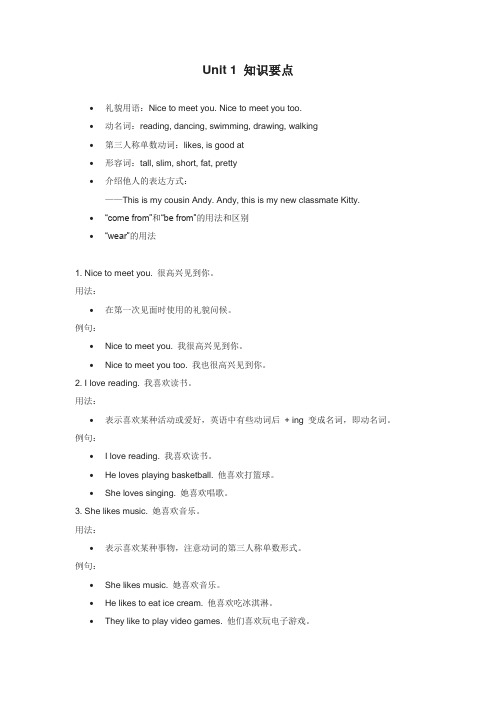
Unit 1 知识要点•礼貌用语:Nice to meet you. Nice to meet you too.•动名词:reading, dancing, swimming, drawing, walking•第三人称单数动词:likes, is good at•形容词:tall, slim, short, fat, pretty•介绍他人的表达方式:——This is my cousin Andy. Andy, this is my new classmate Kitty.•“come from”和“be from”的用法和区别•“wear”的用法1. Nice to meet you. 很高兴见到你。
用法:•在第一次见面时使用的礼貌问候。
例句:•Nice to meet you. 我很高兴见到你。
•Nice to meet you too. 我也很高兴见到你。
2. I love reading. 我喜欢读书。
用法:•表示喜欢某种活动或爱好,英语中有些动词后+ ing 变成名词,即动名词。
例句:•I love reading. 我喜欢读书。
•He loves playing basketball. 他喜欢打篮球。
•She loves singing. 她喜欢唱歌。
3. She likes music. 她喜欢音乐。
用法:•表示喜欢某种事物,注意动词的第三人称单数形式。
例句:•She likes music. 她喜欢音乐。
•He likes to eat ice cream. 他喜欢吃冰淇淋。
•They like to play video games. 他们喜欢玩电子游戏。
4. He is good at Maths. 他数学很好。
用法:•表示擅长某方面。
例句:•He is good at Maths. 他数学很好。
•She is good at dancing. 她跳舞很厉害。
•They are good at playing football. 他们踢足球很厉害。
- 1、下载文档前请自行甄别文档内容的完整性,平台不提供额外的编辑、内容补充、找答案等附加服务。
- 2、"仅部分预览"的文档,不可在线预览部分如存在完整性等问题,可反馈申请退款(可完整预览的文档不适用该条件!)。
- 3、如文档侵犯您的权益,请联系客服反馈,我们会尽快为您处理(人工客服工作时间:9:00-18:30)。
牛津译林版七年级英语上册Unit1知识点复习归纳一.单词牢记及拓展1.e-dog [ _d_g ] 电子狗(electronic 电子的+ dog 狗= 电子狗)2.master [ m_st_ ] 主人;大师3.grade [ gr_d ] 年级注:在英语中表示几年几班的时候,语序与中文要颠倒。
例如:3年级4班Class 4,Grade 3 同时注意大小写4.student [ st_d_nt ] 学生5.reading [ r_d__ ] 阅读(动词read + ing = 名词)6.classmate [ kl__sm__t ] 同班同学7.slim [ sl_m ] 苗条的8.over [ __v__ ] 穿过,在...... 正上方与under 在......正下方相对9.classroom [ kl__sr__m ] 教室(class 上课+ room 房间= 上课的地方,即教室)10.dancing [ d_ns___ ] 跳舞,舞蹈(动词dance + ing = 名词)11.swimming [ sw_m___ ] 游泳(动词swim + ing = 名词)12.age [ ____ ] 年龄at the age of... .......岁13.looks [ l_ks ] 外貌( look 用肉眼看,看起来+ s = 外表,外貌)14.cute [ k__t ] 可爱的;讨人喜欢的15.hobby [ h_b_ ] 业余爱好复数形式:hobbies16.glad [ gl_d ] 高兴的同义词:happy,excited be glad to do sth. 很高兴/乐意做某事17.everyone [ _vr_w_n] 每人,人人(every 每个+ one =everyone)18.glasses [ gl__s __ __ ] (复)眼镜( glass 玻璃+ es = 两块玻璃构成眼镜)二.重点词组1.look after/take care of 照顾;照看2.love e-dogs/reading/sports 喜欢电子狗/阅读/运动3.good morning/afternoon/evening 早上/中午/晚上好4.welcome to class 1, grade 7 欢迎来到七年级一班welcome home 欢迎回家5.a new student at Sunshine Middle School 阳光中学的一名新学生6.12 years old 12岁7.my new classmates 我的新同班同学8.play football 踢足球9.after school 放学后e from/be from 来自11.be good at/do well in (doing )sth 擅长于做某事12.have long/short hair 有着长/短发13.over there 在那边over the desk 在课桌的正上方14.chinese/English/Maths teacher 语文/英语/数学老师15.live with my family in Beijing 和我的家人一起住在北京16.wear glasses 戴眼镜17.like all the lessons 喜欢所有的课程18.be nice/kind/friendly to sb. 对某人友好的19.have an e-dog 有一只电子狗三.重点句型1.What’s your name? 你叫什么名字?2.My name is Hobo./I am Hobo. 我叫霍波。
3.How to look after your e-dog. 怎样照顾你的电子狗。
4.Nice to meet you./Glad to meet you. 见到你很高兴。
Nice to meet you too./Glad to meet you too. 见到你我也很高兴。
5.Now let’s meet my new classmates. 现在让我们来会见一下我的新同班同学。
6.Hi, Kitty. This is my cousin Andy. Andy, this is my new classmate Kitty.你好,基蒂,这是我的表哥安迪。
安迪,这是我的新同学基蒂。
7.She is tall and slim. 她既高又瘦。
8.Oh, I see. 喔,我明白了。
9.I come from Nanjing, but now I live with my family in Beijing.我是南京人,但是我现在和家人住在北京。
四.语法解析1.喜欢做某事Like/love to do/doing sth.Enjoy doing sth.Be fond of doing sth.用动词的适当形式填空:1.Amy likes ______ in the library.(read)2.My mother loves ______ very much.(shop)3.( )My mother loves _______ at weekends,but my father likes ______ at home.A.shop;stayB.shopping;to stayC.shopping;stayD.shoping;staying2.几岁(表年龄)的多种表达例如:我12岁了。
I’m 12 years old.I’m a boy of 12.I’m a 12-year-old boy.I’m at the age of 12.句型转换:1.The boy in black T-shirt is 13 years old._______________________________________________(对划线部分提问).The boy in black T-shirt is _____ ______ ______ _____ ______.3.Put on/ wear / inPut on “穿、戴”,指穿的动作,后接要穿、戴的东西,其反义词为:take off 脱下例如:It’s cold today. Put on your coat, please.Wear “穿、戴”,指穿的状态例如:Many girls wear skirts in summer.Sandy wears glasses.In “穿着” 介词,后接衣服,也可接衣服,既可作定语,也可作表语。
例如:The girl in red is Kitty’s sister.The woman is in blue.用适当的词填空:*_______ your coat. It’s cold today.*The man always _____ a black hat.*She felt a bit cold and found she was only _____ her sweater. She left home in such a hurry that she forgot ______ her thick coat.4.Let us do sth. 征求对方意见,对方不加入Let’s do sth.包括了征求其意见的对方,表示大家一起做某事。
例如:Let us play basketball. (请你)让我们打篮球吧。
Let’s play basketball. 咱们打篮球吧。
5.Play football 踢足球(球类运动不加冠词the)Play the piano (弹奏乐器要加冠词the)6.表地点时in/at 的区别in通常指大地方,比如:洲、国家、城市等;虽然是小地方,但说话人住在那里的情况下,也可用in。
商店、学校、机关等,若看做一个地点时用at,看做一个场所时用in。
例如:I met him at the post-office.I am working in the post-office.at通常指小地方,如车站、码头、村子、农场、工厂、学校等。
用于门牌号码前。
例如:I arrived at the post-office at 9 o’clock in the morning.He lives at 11 Zhongshan Road.on表示地点,一般指与面或线接触,意为“在……上;在……旁”。
如:The picture was hanging on the wall.随堂练:1. I’m _______ China.2.I’ll meet my uncle _______ the airport _____five past one.3. There’s a picture __________ the wall.4.John is _____the hospital.5.There is a bird ___ the tree.6.There are many apples _____ in the tree.7.I put a cup of tea ____ the table.8.I saw a cat ___ the corner of the street.7.欢迎来到某地:welcome to sp. 但表示欢迎回家时,用welcome home.欢迎某人:welcome sb.8. 含be动词的一般现在时be动词是系动词的一种,表示“……是……”的意思。
现在式有am,is,are三种。
这三种动词的原形是be,所以它们称为be动词。
8.1 be动词的现在式be动词的现在式有am,is,are三种,分别接在不同人称的主语之后:8.2 be动词句型的构成肯定句:主语+ be动词(am/is/are)...例如:I am a doctor.我是一名医生。
Mary is at work.玛丽在工作。
He is very brilliant.他非常聪明。
否定句:主语+ be动词(am/is/are)+ not...例如:We aren't her classmates.我们不是她的同班同学。
I'm not Tom.我不是汤姆。
(I'm是I am的缩写,读作/aim/。
)It's not / It isn’t a cat,but a dog.这不是猫,而是狗。
注:be动词否定句的缩写方式:is not的缩写是isn't,读作/′iznt/;are not的缩写是aren't,读作/a:nt/;I am~的否定句是I am not~,缩写为I'm not~;am not不缩写在一起。
